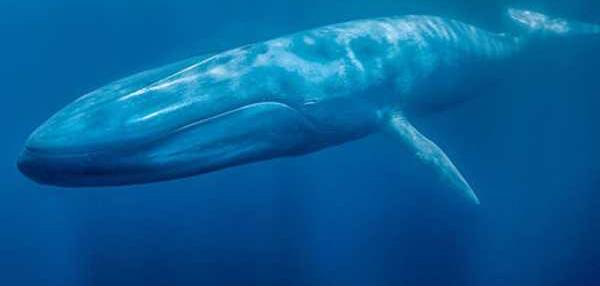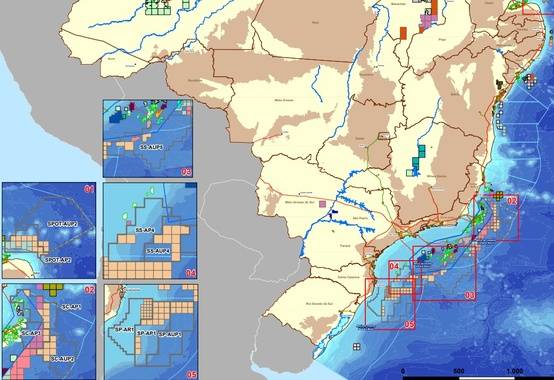
In the ACP petition filed in the Federal Court, the ANDA, the Arayara Institute and the ANAA recall that 89 other marine species threatened with extinction could also be affected by the oil activity
Three civil society organizations filed on Friday September 24 with the Federal Court of the Federal District an urgent injunction to suspend the holding of the 17th call for candidates procedure with a view to the allocation of maritime blocks or "lots" for oil and gas exploration purposes.
The organizations point out that oil activities present risks for the blue whale (Balaenoptera musculus) and 89 other endangered species living in the areas to be exploited.
The Civil Public Action Request (ACP), number 1068148-31.2021.4.01.3400, against the National Petroleum Agency (ANP) and the Union, has been filed by the Animal Rights News Agency (ANDA), the Arayara International Institute and the National Association of Lawyers Specializing in the Defense of Animal Rights (ANAA).
The blue whale is the largest animal living on the surface of the earth. It can grow up to 33.6 meters long and weigh over 140 tonnes. It is the least studied and least known species of whale. It lives in all oceans and is considered a solitary animal by scientists. It is not uncommon to see females with their young as well as small groups of individuals.
ANP - Agência Nacional do Petróleo, Gás Natural e Biocombustíveis is the Brazilian National Agency for Petroleum, Natural Gas and Biofuels, a federal public body responsible for regulating activities related to petroleum, natural gas and biofuels in the Brazil - plans to auction 92 maritime "blocks" on October 7, but has not conducted any conclusive environmental impact study, although she was guided in this direction by technicians from Ibama ( Instituto Brasileiro do Meio Ambiente e dos Recursos Naturais Renováveis ( Brazilian Institute of Environment and Renewable Natural Resources) and ICMBIO ( Chico Mendes Institute for Biodiversity Conservation (ICMBio) is a public organization founded in 2007 by the Minister of Environment Marina Silva to manage the 300 ecological and biological reserves throughout Brazil which extend over 770,000 km2, ie “an area greater than that of Spain ” or of France ).
The maritime lots are located in the sedimentary marine basins of Campos, Pelotas, Potiguar and Santos. The areas to be auctioned involve three federal marine conservation units: the Fernando de Noronha Marine National Park, the surrounding environmental protection area and the Rocas Atoll Biological Reserve.

The ACP “seeks the judicial protection of the specific rights of each blue whale but also of their universal right to live in an ecologically balanced environment, a right that they share with us, human beings, within the framework of Brazilian law. In this action, blue whales are the subject of rights that symbolically represent all other marine animals that will also be affected by the continuity of the 17th round of tendering. "
“The authorization to organize the auction is already a risk to the life of the blue whales, as it will grant the right to the winning bidders to explore their respective lots to find exploitable oil. (...) However, it is clear that there are risks of damage to ecosystems and marine animals. Especially those who are threatened with extinction, ” explains the ACP.
“We are fighting so that billions of animals are not wiped out of Brazilian seas by oil,” said Silvana Andrade, President and Founder of ANDA.
"In this civil action, unlike traditional civil actions concerning the environment, we do not defend the rights of human individuals, nor the universality of humans, but rather the interests and the homogeneous individual rights of blue whales and their diffuse rights. (which they share with us) to an ecologically balanced environment ” , explains Waleska Mendes Cardoso, co-director of the ANAA.
Waleska recalls that it is “important to note that the mere realization of the exploration activity is already a risk for the most fundamental rights of blue whales. These are the rights to a life of dignity, to physical and mental integrity, to health, to food, to the protection of their offspring and to motherhood, to be lived according to their nature and their culture. All of this can be called into question by the simple fact of violating their right to a balanced environment. "
“The various accidents caused by oil exploitation at sea that have occurred in the past have caused a staggering number of animal deaths. Some species have gone extinct and many have taken many years to reestablish the pre-crash population. In places subject to auction, there are also many species that are not endangered, but inhabit these areas. These animals cannot defend themselves. We will fight to prevent these animals from being killed and even extinguished by oil exploration, which is an energy of the past, ” said Nicole Figueiredo de Oliveira, director of the Arayara International Institute.
The ANP has qualified nine companies to participate in the 17th round table, and at least four of them (Chevron, Ecopetrol, Esso and Total) have a history of serious human rights and environmental violations in the countries where they previously worked. These countries are Colombia (Ecopetrol), Ecuador (Chevron), Nigeria (Esso) and Uganda (Total).
The Petrobras Minority Shareholders Association also warned the company, through a letter, that oil exploration in the areas proposed by the ANP presents major environmental risks, which could generate liabilities for the company. .
Anda's lawyer, Evelyne Paludo, also stressed the importance of preserving nature and the animals that live there and of fighting for the guarantee of this preservation through justice. “The entities which have become civil parties in this action in favor of animals, representing civil society. They have a duty to protect and preserve the environment, and it is precisely in this sense that they are acting. However, it has often been necessary to ask the judiciary to remind the public authorities that it is also their obligation to act in the protection and preservation of the environment and animal life, ”he said. declared.
“Whenever basic rights (of humans or other animals) are supplanted by economic power, we have evidence of firm action and trade-off. By reaffirming the contours of environmental protection and its fragile balance for present and future generations, the legislator has not only been concerned with the human species, but also with the present and future generations of other species, who have, by nature, the fundamental right to respect for its habitat, its ecosystem and a safe life. It is the duty of public authorities to allow life to continue, for humans and other animals, ” he concluded.
Posted on 2021-09-29 17:30








Comments